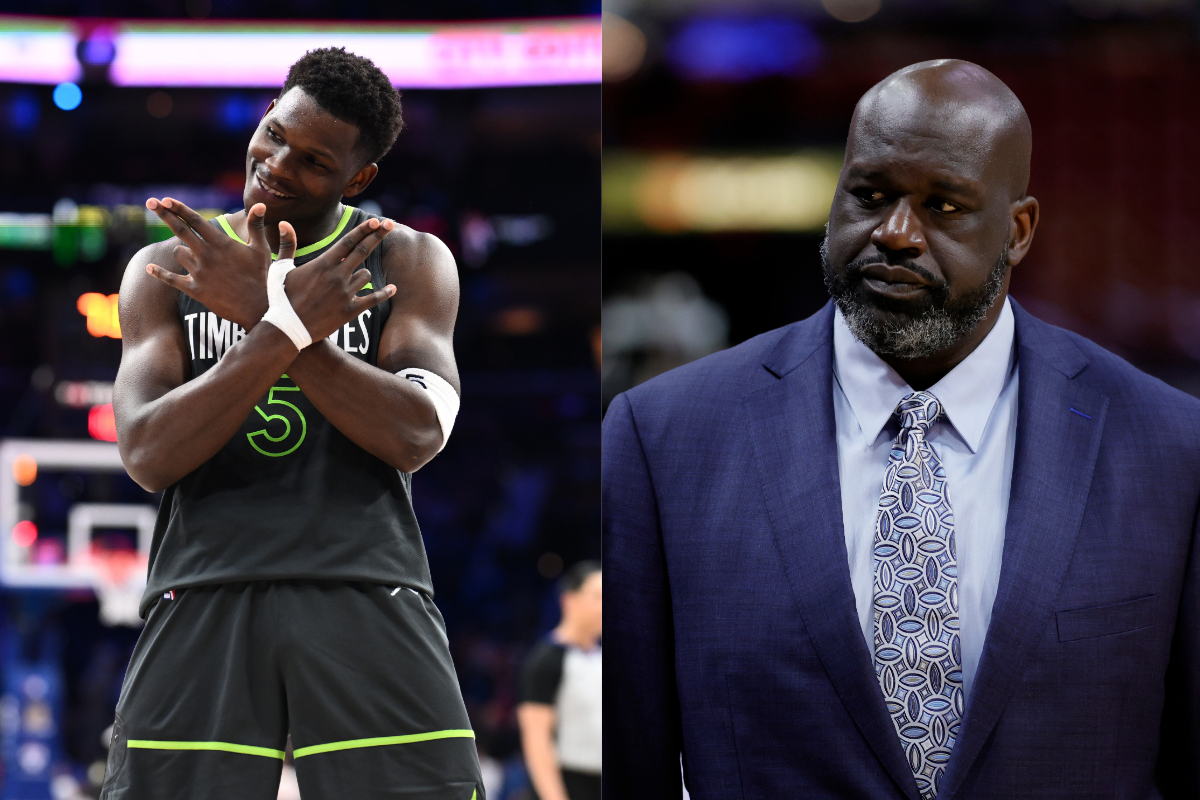
Imago
A collage featuring Anthony Edwards and Shaquille O’Neal

Imago
A collage featuring Anthony Edwards and Shaquille O’Neal

Imago
A collage featuring Anthony Edwards and Shaquille O’Neal

Imago
A collage featuring Anthony Edwards and Shaquille O’Neal
The NBA may not be the No. 1 sport in the country right now, but you can not deny the fact that the NBA revolutionized the sneaker industry globally. As of now, the sneaker market in America only is worth over $25 billion, with Nike and Adidas being the main players. And admit it or not, it was Michael Jordan’s brand pull that helped sneakers become part of a culture. So, after this box-office partnership of MJ X Nike, there was another brand that pulled a major move in the early 90s by betting on a future NBA legend—Shaquille O’Neal.
Watch What’s Trending Now!
First overall pick in the 1992 draft, Shaquille O’Neal was destined for greatness in the NBA. And noticing this, Reebok—another global sneaker brand—placed their bet on an NBA rookie. Although Shaq’s partnership ended with Reebok in 1998 before becoming the brand’s president in 2023, Reebok’s unforgettable 2003 campaign, crafted by Steve Stoute, remains a cultural masterpiece. This campaign was just ahead of its time. Neither was it loud nor forced. It just worked. The kind of work that speaks for itself, the kind that becomes a blueprint. So much so that 23 years later, another giant sneaker brand is being accused of stealing now Shaquille O’Neal-led Reebok’s ideas.
Anthony Edwards, who has been averaging over 27pts a game, is an Adidas athlete. So last month, when Adidas dropped their new ad featuring the Timberwolves’ star, one could not help but wonder if they have seen something like this before. A different brand, with a different agency. But the same concept. And not just in tone or vibe, but beat-for-beat in execution. The sort of similarity that doesn’t feel inspired. It feels copy-pasted.
The mastermind behind the Adidas campaign? Johannes Leonardo. The reaction from the original creative behind the Reebok spot? A mix of raised eyebrows, amusement, and maybe just a little side-eye. The ad in question? It’s a whodunit-based concept. Begins with a chalk tracing of a dead body and detectives speculating who might have done the murder, with subtle showings of the sneakers before fully revealing it.
Steve Stoute took to Instagram and shared a post supposedly calling out Adidas. He captioned the post, “When I first started Translation @reebok was a client and we did this ad (swipe left) in 2003 twenty two years later @adidas I’m sure has no idea that there “creative agency” @johannesleonardo steals the idea.. ( I want my publishing😂)” demanding his publishing rights for something, the inception of which was his doing.
View this post on Instagram
Then he simmered the situation down by saying, “However its cool just don’t say your creating culture if your copying it .. We continue to make amazing creative ideas, So I take it as a compliment.. You tell me , but this DEFINITELY inspired the idea.. shout out to my guys @icet and @theanthonyedwards_ #timetomakethedonuts @wearetranslation,” Shouting out the individuals involved and that brilliant idea cannot be stopped from emerging.
Steve Stoute dressed it in diplomacy, but the edge cut clean — this wasn’t just a clap back, it was a warning. He saw the bite, recognized the mimic, and made it clear: don’t talk about building culture when you’re borrowing the blueprint. Behind the smooth shout-outs was fire — a creative king reminding everyone that real ideas come from the source, not the shadows.
Shaq’s Reebok line revolutionized NBA sneakers by merging performance with bold design. The Shaqnosis and Shaq Attaq pushed boundaries with futuristic aesthetics, and, yes, killer advertisements. While the shoes were great, his larger-than-life persona made them iconic, leading him to acquire a minority ownership in the brand.
Now, the concept of stealing the product of someone is not old news. This has happened multiple times throughout the decades of evolution. There is one such case that is reminiscent of the Reebok-Adidas fiasco. Let us take a look.
Nike’s “You Don’t Know the Half” vs. And1 Mixtapes
The fight over dominance is a long story in basketball. Nike’s “You Don’t Know the Half” campaign, launched in the early 2000s, was slick, gritty, and rooted in raw street ball energy. It showcased real hoopers in city environments, told emotional backstories, and tapped into the soul of the game. Not just the stats, but the struggle. It felt powerful, and fresh… but if you were paying attention, it also felt familiar.
That’s because And1 had already laid the groundwork. Years before Nike’s campaign dropped, And1 Mixtapes were the blueprint. They gave a voice to streetballers who weren’t in the NBA but were household names on playgrounds. Players like Hot Sauce, Skip 2 My Lou, and AO weren’t just showing off, they were redefining basketball culture. And1 made streetball cinematic before anyone else thought to frame it that way.
Well, Nike didn’t copy it shot-for-shot, but the influence was undeniable. The aesthetics, the music, the rawness. It had And1’s DNA all over it. But instead of acknowledging that, Nike rolled it out as its own evolution. Sound familiar? That’s exactly what Steve Stoute is calling out with Adidas. He helped shape a campaign for Reebok that was more than just an ad. It was a cultural moment. Now, years later, Adidas drops something eerily similar without so much as a nod. No credit, no context, and that’s what bothered Steve Stoute.
And here’s the thing: it’s okay to be inspired. But in a culture where authenticity matters, if you’re going to follow the blueprint, the least you can do is mention the architect.

